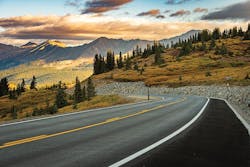NO. 4: Cottonwood Pass
This project began at an elevation of 9,363 ft and ended at the summit of 12,126 ft.
Before you say, “Wow,” there’s more.
Over the length of the original 13.1 miles, now shortened to 12.5 miles through straightening of switchbacks, there were many environmental resources that had to be avoided such as wetlands and habitat for the Canada lynx and boreal toad.
The Federal Highway Administration (FHWA) worked closely with Gunnison County Public Works and the Gunnison National Forest to develop a context-sensitive project that addressed key operational and safety issues, while being mindful of the surrounding environment. FHWA’s willingness to look at alternatives eliminated approximately 1 mile of retaining walls and $8 million in construction costs from the original $30 million design cost estimate.
Due to the potential danger for the public and construction workers due to the limited site distance of the switchbacks and other existing tight curves, the road was closed during the majority of construction. Closing a mountain pass for over two years was not an easy feat. Permitees and outfitters on the National Forest were also severely impacted. Buy-in from local elected officials and communicating to the public was crucial. Marlene Crosby, the Gunnison County Public Works Director, was instrumental in making this concept a reality.
“The reconstruction and paving of Cottonwood Pass is an example of teamwork at its finest,” Crosby said. “The cooperation of the Federal Highway Administration, the Gunnison Ranger District of the Gunnison National Forest, and Gunnison County allowed a 13.9-mile segment of gravel road that was difficult to maintain for the heavy volume of traffic to be redesigned to address safety, drainage, and surfacing in an environmentally appropriate manner. The result is a beautiful drive over the Continental Divide. Residents and visitors give the project high marks.”
During construction, as one might suspect at such altitudes, weather and temperature were constant challenges. At the highest points of the project, work typically did not begin until late June and became increasingly challenging in October to continue. In between, it was still common to have rain, wind, and occasional snow complicate operations, even at the lower elevations. Another challenge was large pockets of subsurface water and soft soil, which are not unusual in mountainous terrain. 28,000 cu yd of unsuitable soil was removed; 16,600 lin. ft, or over 3 miles, of underdrain were installed to capture subsurface water; and over 21,000 cu yd of rock embankment was placed. For additional cost savings, Gunnison National Forest performed NEPA for geotech testing on National Forest System Lands adjacent to the project to identify an adequate gravel source near the project. To build the pavement’s foundation, 33,600 cu yd of aggregate base course was crushed on-site from this source. Similarly, the aggregate for the asphalt pavement was also crushed on-site. Using these on-site materials not only reduced project cost, it also reduced the amount of fuel spent and fumes emitted by eliminating trucking from the United Companies quarry near the city of Gunnison, over 50 miles away. In the end, over 42,000 tons of asphalt was produced and placed. The quality of asphalt material and construction resulted in a perfect score from the Colorado Asphalt Pavement Association (CAPA), and the 2020 CAPA award winner.
Constructing a road at that altitude and in that terrain under those weather and temperature conditions was not an easy feat, but resulted in what is now the fourth-highest paved road in the U.S.
Federal Highway Administrator Nicole R. Nason told R&B: “The Cottonwood Pass project exemplifies what can be achieved through successful planning, engineering, and partnership. The FHWA, Gunnison County, and the Gunnison National Forest have delivered design and construction improvements on this scenic highway that will enhance safety and access to recreation on more than 1 million acres of national forest for generations to come.”


